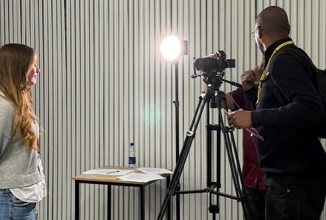
Music Technology
Overview
Music Technology will support you in forming personal and meaningful relationships with music technology through the development of musical knowledge, understanding and skills.
These include recording, technology-based composition, listening, analysing and production. You will be encouraged to engage with a wide range of music technology techniques and develop an understanding of the historical and cultural contexts of the use of music technology.
Entry requirements
A GCSE in Music is desirable but not essential. You MUST have an active interest in the subject i.e., play an instrument, be a bedroom DJ etc. or partake in practical Music groups.
Learning & Assessment
Why study this subject?
Music Technology is an exciting opportunity to delve into developing your knowledge, skills and understanding of exactly how you can produce music within a studio environment. This gives you the core knowledge needed to go onto practical and state of the art studio based courses within higher education. You get to explore how to record music, as well as to produce it and work through the full process of creating music.
What can you expect from this A level?
Lessons focus on developing practical skills in a state-of-the-art classroom with access to a Mac Suite, and Recording Studio. You'll work with Logic, MIDI keyboards, and produce various music styles while learning to analyse techniques. You'll also record and manipulate music in a professional setting.
What can you do with a qualification in this subject?
The subject can lead to degrees in Music Production, Sound Engineering, Audio Technology, and Music Composition.
It also offers a variety of career opportunities, including roles such as AV Technician, Digital Audio Editor, Live Sound Engineer, Music Producer, Music Therapist, Sound Designer, SFX Technician, and Composer for video games and other media.
Assessment
The assessment consists of four components.
Component 1 (20%) is a non-examined assessment where you develop skills in capturing, editing, processing, and mixing an audio recording of a song provided by the exam board.
Component 2 (20%) involves creating and manipulating sounds to produce a technology-based composition using state-of-the-art facilities.
Component 3 (25%) is an exam testing your knowledge of recording and production techniques.
Component 4 (35%) focuses on understanding and applying editing, mixing, and production techniques through practical outcomes using industry-standard programs.
Modules / Topics
Component 1
Recording.
Component 2
Technology Based Composition.
Component 3
Listening and Analysing.
Component 4
Producing and Analysing.
Trips / Visits / Enrichment
Enrichment
The Performance Lab
SING 26 - National Youth Choir (Seasonal Enrichment)
What can I do with a qualification in this subject?
Pursuing an A Level in Music Technology, you are equipped with technical skills and creative insight, paving the way for a variety of exciting careers in the music and audio industries and providing a strong foundation for pursuing higher education degrees in Music Production, Sound Engineering, Audio Technology, and Music Composition.






